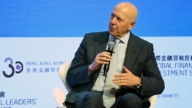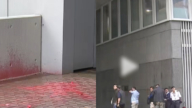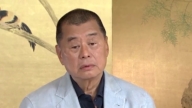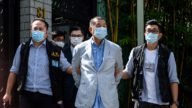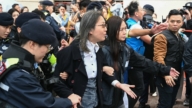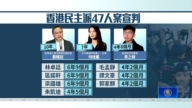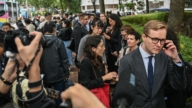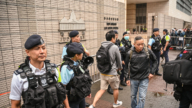【新唐人2014年09月24日訊】9月22號,當中外媒體聚焦香港大專生罷課事件時,中共國家主席習近平也在北京接見了由全國政協副主席、前香港特首董建華率領的工商專業界訪京團。習近平表示,北京對香港的政策方針沒有變,堅持實施「一國兩制」和《基本法》,但習近平沒有提及《基本法》所承諾的「港人治港、高度自治」,這讓香港市民非常擔心。
22號下午,習近平在北京人民大會堂接見了董建華率領的訪問團。這些成員包括長實集團主席李嘉誠、恆地主席李兆基、嘉裡主席郭鶴年等70多人。而主管港澳事務的中共人大委員長張德江,和中共國家副主席李源潮,也出席了會面。
習近平在開場白表示,北京對香港方針政策沒有變,也不會變,並提出三個「堅定不移」,包括堅持在香港實施「一國兩制」、《基本法》﹔支持香港推進民主和維持繁榮穩定。
香港立法會議員單仲偕:「他這一趟接見香港主要的專家,所謂富豪,是因為人大常委決定以後,他明白到香港有一些反彈,比如昨天開始香港有學生罷課,有佔中活動等。習近平在這個時間去接見香港的富豪,主要是穩定在香港的政策,希望他們能夠繼續支持中央對香港的管治。」
和以往不同的是,這一次,習近平沒有說「支持」特區政府依法施政,而是說:「希望在中央政府的領導下,在特區政府和行政長官的帶領下,香港同胞繼續推動香港取得各方面的發展。」但《新華社》事後發稿時,卻把這句原話改為「在中央政府大力支持以及行政長官和特區政府帶領下」,把原有的「領導」一詞改回為「支持」。
香港城市大學政治學教授、「真普選聯盟」召集人鄭宇碩:「現在中央政府清楚表明,它要領導香港,那一國兩制去哪裏了,這也是香港人目前最大的擔心,不單是沒有民主的選舉制度了,連一國兩制、高度自治也沒有了。」
習近平這番公開談話,沒有提到香港近期敏感的政治問題。不過當天晚上,訪問團成員、政協常委陳永棋,在北京接受香港電臺記者訪問時透露,習近平在隨後的閉門會談中,談到了香港的政改爭議。習近平表示,在香港搞普選要符合中國國情,以及香港區情。特首人選必須是北京信任的所謂愛國愛港人士。
陳永棋還引述習近平的話說,這次人大常委會的決定,以及《基本法》的規定,香港方面必須嚴格遵守。對於各種破壞社會秩序的違法活動,北京堅決支持特區政府依法處置。
香港立法會議員單仲偕認為,習近平這次談話,相較於6月推出的白皮書,在內容上,沒有多大差異。
單仲偕:「他(習近平)表示強硬態度,也是一如既往,他過去有到香港來,也談到關於管治問題,他的看法也是一樣,他覺得香港是中國的一部分,雖然是所謂依法管治,你說的依法管治,其實是根據《基本法》,中央對香港有管治的權力,這個跟白皮書,只是表述的方式不同,內容是一樣的。」
香港城市大學政治學教授、「真普選聯盟」召集人鄭宇碩指出,北京當局此次言論非常強勢,令人擔憂。
鄭宇碩:「一個馬列主義政權的基本心態反映出來了,就是要清楚告訴你,政權還是在我們手上,權力還是在我們手上,是我們領導的,所以你們知道這個是沒有甚麼民主可言的。」
據香港中文大學9月中旬進行的一項調查顯示,在1006名受訪港人中,有21%的人因為政治因素,正考慮移民。
採訪/朱智善 編輯/陳潔 後製/郭敬
Beijing Tough on Hong Kong Businessmen
On Sept. 22, when media at home and abroad were
focused on the Hong Kong college students boycott
of classes incident, Chinese President Xi Jinping received
the business and professional delegation headed
by CPPCC National Committee vice chairman and former
Hong Kong Chief Executive Tung Chee-hwa in Beijing.
Xi Jinping said that Beijing has not changed its policy
guidelines on Hong Kong, and would adhere
to the “One Country, Two Systems" practice
and the Basic Law of Hong Kong.
But he didn’t mention the promise stipulated
in the Basic Law, that is, “Hong Kong people ruling
Hong Kong” and “a high degree of autonomy,”
which have worried Hong Kong people.
On the afternoon of Sept. 22, Xi Jinping received
the delegation headed by Tung Chee-hwa in the Great Hall
of the People in Beijing.
The delegation was composed of over 70 people including
Cheung Kong Holdings chairman Li Ka-shing, Henderson
Land Development Company Ltd. chairman Lee Shau-kee,
and Kerry Group Limited chairman Kuok Hock Nien.
In addition, Zhang Dejiang, chairman of the Standing
Committee of China’s National People’s Congress (NPC),
who supervises Hong Kong and Macao Affairs, and China’s
vice president Li Yuanchao also participated in the meeting.
Xi Jinping said in his opening remarks that Beijing’s policy
towards Hong Kong has not changed, and its basic policy
in Hong Kong will not change.
He also proposed the “three unwaverings.”
This includes unwavering implementation
of the “One Country, Two Systems” principle
and the Basic Law, unwavering support for the law
to promote democratic development, unswervingly
safeguarding the long-term prosperity
and Hong Kong’s stability.
Hong Kong Legislative Council member Sin Chung-kai:
“His meeting with the so-called Hong Kong professionals
and tycoons was because the standing committee of people’s
congress made the decision to restrict electoral reforms.
He realized that there have been some protests in Hong
Kong, such as the students’ walkout yesterday,
and the “Occupy Central” activities.
Xi’s meeting with the Hong Kong tycoons at this time
was mainly for stabilizing its policy in Hong Kong, hoping
to continue to support the central government’s
governance in Hong Kong.”
What’s different this time is that Xi Jinping didn’t mention
“support” for the Government of the Hong Kong Special
Administrative Region’s governance in accordance with law,
and instead said, “We hope that under the leadership
of the central government and the SAR Government as well
as the Chief Executive, people in Hong Kong can continue
to push Hong Kong to achieve Hong Kong’s developments
in various aspects.”
But the “leadership” in the press release was changed
to “support” by Xinhua News Agency afterward.
Joseph Cheng, professor of Political Science at the City
University of Hong Kong, chairman of the “Genuine
Universal Suffrage Alliance”: “Now that the central
government made it clear that it wants to lead Hong Kong,
what worried the Hong Kong people the most is where
the “One Country, Two Systems” principle is;
That not only wouldn’t we have a democratic election
system, but we wouldn’t have the “One Country,
Two Systems” and the high degree of autonomy.”
Xi Jinping made no mention of the recent sensitive political
issues in Hong Kong in his public remarks.
But when interviewed by a Hong Kong TV station in Beijing
that evening, Chen Yongqi, a member of the delegation,
who is also a member of the CPPCC Standing Committee,
disclosed that Xi Jinping did touch on the topic
of the controversial political reform in Hong Kong
in a closed-door meeting afterward.
Xi said that the universal suffrage in Hong Kong should be
in compliance with China’s national situation
and the situation in Hong Kong region.
In other words, the Chief Executive candidate
must be so-called patriotic and also trusted by Beijing.
Chan Wing-kee also quoted Xi Jinping as saying that
the decision made by the Standing Committee of the National
People’s Congress and the provisions stipulated
in the “Basic Law” must be strictly observed by Hong Kong.
As to the illegal activities that would disrupt public order,
Beijing will firmly support HKSAR Government’s disposal
in accordance with law.
Hong Kong Legislative Council member Sin Chung-kai
said that in comparison with the White Paper released
in June, what was mentioned by Xi Jinping this time makes
not much difference.
Sin Chung-kai: “His (Xi Jinping’s) tough stance
is no different from the past.
He has been to Hong Kong, and has also talked
about governance issues.
His mentality is still the same— that Hong Kong
is part of China.
Though there has been the so-called the governance according
to laws, it is in fact what he was meant is the ‘Basic Law’,
and the central governing still has the authority in Hong Kong.
The only difference from the White Paper is simply
the different way of expression… the content is the same.”
Professor Joseph Cheng pointed out that Beijing’s stance
this time is very strong, so it’s worth worrying.
Joseph Cheng: “The Marxist-Leninist regime’s basic attitude
has surfaced.
That was to clearly tell you that the political power is still
in their hands; they still have authority;
they are the leadership, so you know there would
be no democracy at all here.”
According to a survey conducted by the Chinese University
of Hong Kong in mid-September, among the 1,006
Hong Kong people surveyed, 21 percent were considering
emigration for political reasons.
Interview/Zhu Zhishan Edit/ChenJie Post-Production/GuoJing


